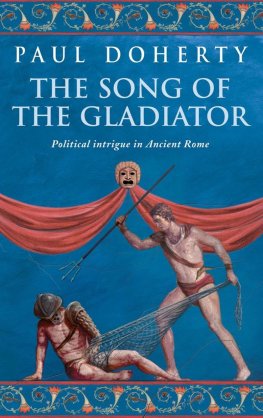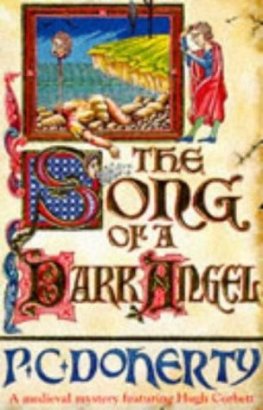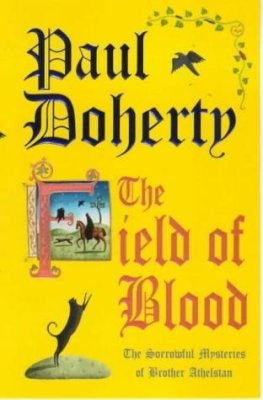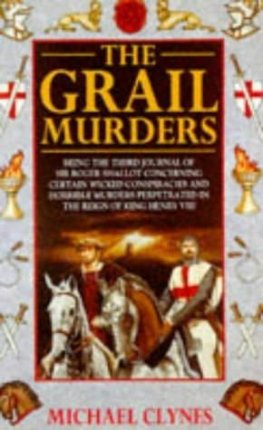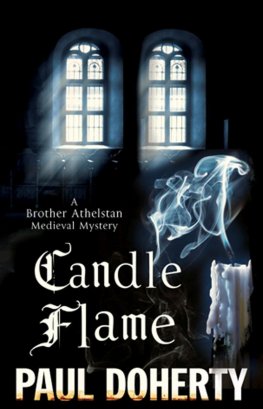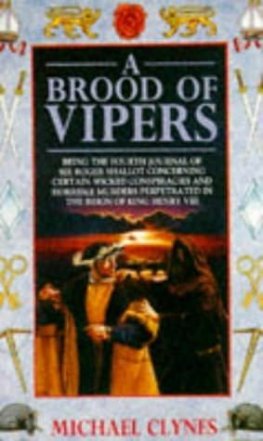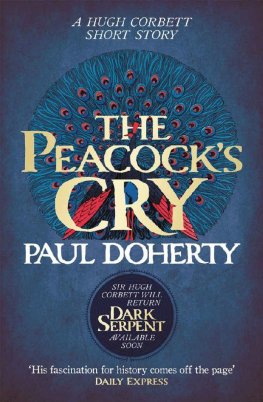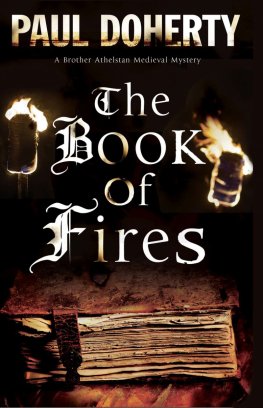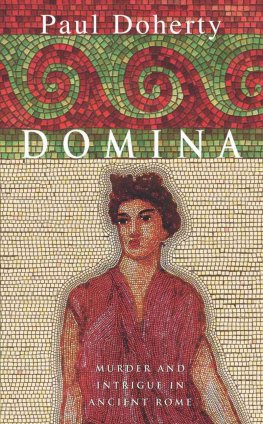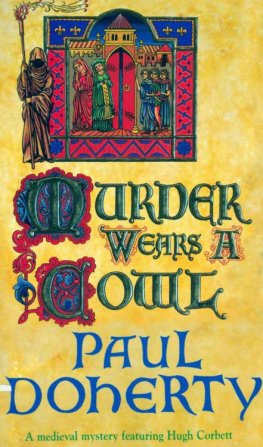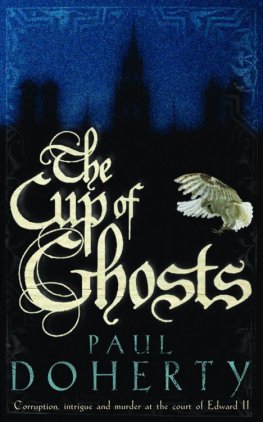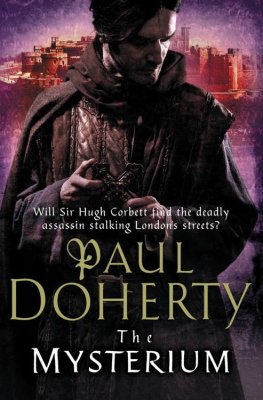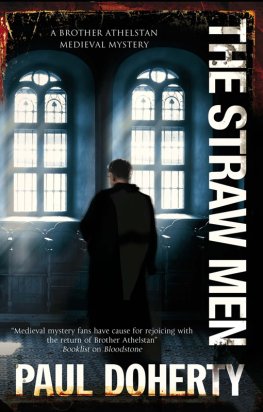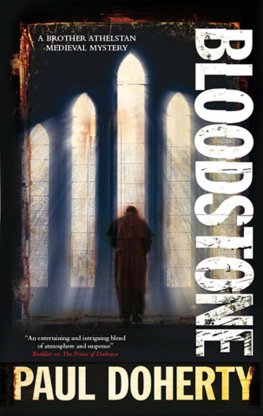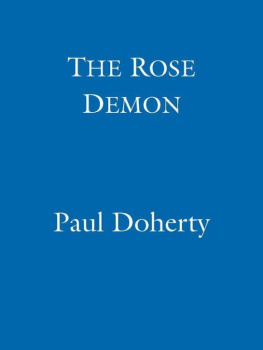Paul Doherty - Murder Most Holy
Here you can read online Paul Doherty - Murder Most Holy full text of the book (entire story) in english for free. Download pdf and epub, get meaning, cover and reviews about this ebook. year: 2011, publisher: Severn House Publishers, genre: Detective and thriller. Description of the work, (preface) as well as reviews are available. Best literature library LitArk.com created for fans of good reading and offers a wide selection of genres:
Romance novel
Science fiction
Adventure
Detective
Science
History
Home and family
Prose
Art
Politics
Computer
Non-fiction
Religion
Business
Children
Humor
Choose a favorite category and find really read worthwhile books. Enjoy immersion in the world of imagination, feel the emotions of the characters or learn something new for yourself, make an fascinating discovery.

- Book:Murder Most Holy
- Author:
- Publisher:Severn House Publishers
- Genre:
- Year:2011
- Rating:5 / 5
- Favourites:Add to favourites
- Your mark:
- 100
- 1
- 2
- 3
- 4
- 5
Murder Most Holy: summary, description and annotation
We offer to read an annotation, description, summary or preface (depends on what the author of the book "Murder Most Holy" wrote himself). If you haven't found the necessary information about the book — write in the comments, we will try to find it.
Murder Most Holy — read online for free the complete book (whole text) full work
Below is the text of the book, divided by pages. System saving the place of the last page read, allows you to conveniently read the book "Murder Most Holy" online for free, without having to search again every time where you left off. Put a bookmark, and you can go to the page where you finished reading at any time.
Font size:
Interval:
Bookmark:
Paul Doherty
Murder Most Holy
PROLOGUE
The Dominican friar crouched at the prie-dieu in the deserted Church of Blackfriars, his gaze torn between the gold-encrusted crucifix and the pinewood coffin containing the murdered corpse of his colleague.
Brother Alcuin stirred restlessly. He chewed his lip and clasped his fingers tightly together. The others might think differently but he knew the truth. Brother Bruno had been brutally murdered. Alcuin was both angry and terrified: angry that such a foul act could be carried out in a Dominican monastery, terrified because he knew the murderer had meant to strike at him.
It had been so simple. Alcuin had received a note, written, of course, anonymously, telling him to come to the crypt just after Vespers. Angry at the farce which had recently been discovered and the pious mockery behind it all, he had gone to find Bruno lying at the foot of the steep steps leading down to the crypt, his neck twisted, his brains congealing in the pool of blood from his shattered head.
Father Prior had reached the swift conclusion that Bruno had accidentally slipped on the top step and crashed to his death. Alcuin, however, knew different. Somehow the murderer had been waiting and Brother Bruno had either been tripped or pushed down those steep, sharp, stone-edged steps. That had been the previous evening. Tomorrow, after morning mass, Brunos Dominican brethren would sing the Requiem and bury their poor colleagues body here behind the high altar. They would talk softly amongst themselves about Brunos qualities and, in time, perhaps sooner rather than later, he would be forgotten, the manner of his death becoming a vague memory whilst his assassin walked triumphantly away.
Alcuin looked up and stared at the crucifix. Surely Christ would not allow this? Murder was one of those sins which cried out to heaven for vengeance. Justice would have to be done. But should he be part of that justice? Who would believe him, a mere sacristan and cellarer? Only he and his friend the ancient librarian Callixtus knew the truth, but they couldnt discover the proof. The rest of the community would say it was spite. Theyd allege Alcuin was possessed of some foul, cunning demon. He might be sent to Rome or Avignon to answer to his superiors or, worse still, handed over to the Inquisitors to be interrogated, questioned and tried. And then what?
Alcuin wiped the beads of sweat from his broad brow. His pallid angular face became more morose as he stared into the gathering darkness. Of course, worse might happen. Like Brother Athelstan, he might be removed from Blackfriars and sent to some dingy parish church to minister to the unwashed and unlettered. Alcuins sour face creased into a smile.
Athelstan, Athelstan, he murmured. Why arent you here? I need you now. The Order does. Christ the Seigneur requires your sharp eye and subtle wit.
The smile faded. Athelstan had not been invited to the meeting of the Inner Chapter of the Dominican Order at their Mother House in Blackfriars. Athelstan was now parish priest of St Erconwalds in the slums of Southwark, talking to his cat and studying the heavens.
Do you know, Alcuin, Athelstan had once said to him, I once spoke to a man who had travelled to Persia and spoken to the Magi. They are wise men who study the heavens. He told me a strange story. How once there were no stars, no sun, no moon. Nothing but a dark gloomy mass which, at Gods insistence, exploded into burning rock to form the universe, of which the earth is but a small part.
Alcuin shook his head. Perhaps it was as well Athelstan wasnt here when he talked of theories like that. Once again Alcuin recalled his colleagues dark, sharp face and brooding eyes. Athelstan had been meant for higher things. A brilliant student in the novitiate, he had broken his vows and, with his mind full of romantic stories, run away to the wars, taking his younger brother Francis with him. Athelstan had returned, Francis had not. His parents died from sheer grief and only Father Prior had saved Athelstan from the full rigour of Dominican law. Athelstan had finished his studies, taken his vows as a friar, been ordained a priest and then despatched to work amongst the foul alleyways of Londons slums.
Alcuin heard a sound and lifted his head. He stared round the darkening sanctuary, his gaze passing swiftly over the huge statues of the Apostles standing in their niches. No one could be here. He had wanted to be alone to pray and think during the quiet time between Vespers and Compline. Alcuin rubbed his face between his hands, lifting his head, once more staring up at the crucifix. This gave the assassin, who had slid up behind him, the opportunity he needed to wrap the garrotte string round Alcuins thin, scrawny throat. For a few seconds the sacristan struggled violently but the noose tightened and, with the sound of his own blood pounding in his ears Alcuin died before he could cry out, whisper a prayer or whisper the name of his old friend Athelstan.
On the comer of the stinking alleyway opposite St Erconwalds, another person stood, staring at the sombre, gloomy mass of the church. He too wondered about past sins and Gods imminent vengeance and justice. The watcher kept close to the urine-stained wall. He ignored the beggar whining behind him, shifting his feet now and again as foraging rats slipped out of the crevices in the wall to hunt amongst the reeking piles of offal and muck.
From a window further up the alleyway a young girl began to sing in a clear, sweet voice that seemed out of place in that fetid passageway and most inappropriate to the watcher in the darkness. The man leaned against the wall. The song was bittersweet, evoking past memories and, above all, a secret sin. Yet he had done everything he could: a hundred wax candles lit before the statues in St Pauls Cathedral, a pilgrimage to lie prostrate before Beckets tomb at Canterbury, as well as money freely given to the poor. He had even gone to those who dabbled in black arts, creatures of the night with their books of spells and secret airless chambers. He had slipped a coin under the tongue of a hanged man and, following the instructions of the sorcerer, spent two nights beneath the scaffold, chanting a song to the Dark Lord that his secret be kept hidden.
The watcher stared up at the top of St Erconwalds tower. He caught a sparkle of reflected light which signalled that Father Athelstan was there with his telescope and zodiac charts, consulting the heavens, waiting on this balmy summers night for the evening star to appear. The watcher stirred. Truly scripture was right sin always pursued the sinner. He could feel it close about him as if it was some loathsome creature crawling along the alleyway behind him. He could smell its breath and feel its cold claws on the nape of his neck, and yet what could he do? To confess would be to hang; to stay silent would only put off the evil day. He looked towards the church, the House of God and the gate of heaven. Yet, for the watcher in the darkness, the church reeked of an ancient sin.
CHAPTER 1
Sir John Cranston, the large fat plain-speaking Coroner of the City, leaned against the high-backed chair and sipped appreciatively from a jewel-encrusted cup, brimming with the best the vineyards of Bordeaux could produce. He burped gently and beamed around him. The hall was lit by pure resin torches and great wax candles; pages wearing the livery of John of Gaunt, Duke of Lancaster, lined the chamber holding further torches so that, despite the darkness, the room shone and glittered as if it was a summers day.
Truly wonderful, Cranston murmured to himself.
John of Gaunts main hall in his Palace of Savoy on the Thames was as opulent and rich as any papal palace at Avignon, or any chamber belonging to the great Italian princes such as the one whom Gaunt was hosting at this splendid banquet. Cloth of gold, thick and embroidered with silver thread, covered every inch of the wall beneath the hammerbeam rafters. The glass in the windows was of various hues and each pane illustrated a story from the bible or classical mythology. A yellow and black turkey carpet made from the purest wool covered the hall from wall to wall. The cloths on the tables were silk and every plate and goblet fashioned out of precious metal. No wonder John of Gaunt, Duke of Lancaster and Regent of the realm whilst his nephew Richard II was still a boy, had ordered chosen men-at-arms to stand discreetly around the hall, one to watch every diner, for the duke would allow no thieves in his household. Gaunt had provided this banquet to show his magnificence and to entertain the Lord of Cremona, not to provide easy pickings for the thieves and rascals who hung around every palace.
Font size:
Interval:
Bookmark:
Similar books «Murder Most Holy»
Look at similar books to Murder Most Holy. We have selected literature similar in name and meaning in the hope of providing readers with more options to find new, interesting, not yet read works.
Discussion, reviews of the book Murder Most Holy and just readers' own opinions. Leave your comments, write what you think about the work, its meaning or the main characters. Specify what exactly you liked and what you didn't like, and why you think so.

